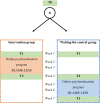BLAME-LESS STUDY: a two-arm randomized controlled trial evaluating the effects of an online psychoeducation programme for adolescents who have experienced physical/sexual violence or sexual abuse. Rationale, study design, and methods
- PMID: 38372268
- PMCID: PMC10878330
- DOI: 10.1080/20008066.2024.2315794
BLAME-LESS STUDY: a two-arm randomized controlled trial evaluating the effects of an online psychoeducation programme for adolescents who have experienced physical/sexual violence or sexual abuse. Rationale, study design, and methods
Abstract
Background: Victims of physical/sexual violence or sexual abuse commonly experience defense responses that result in feelings of guilt and shame. Although trauma-focused interventions are effective in treating post-traumatic stress disorder symptoms, the presence of trauma-related shame and guilt can potentially hinder the process of disclosure during treatment, thus diminishing their overall effectiveness. It is hypothesized that providing psychoeducation about common defense responses will reduce feelings of shame and guilt, thereby increasing receptivity to trauma-focused treatment.Objective: This paper describes the rationale, study design, and methods of the BLAME-LESS study. The effects of a brief online psychoeducation program will be compared with a waiting-list control group. The intervention aims to reduce feelings of trauma-related shame and guilt that adolescents experience regarding their own defense responses during and after physical/sexual violence or sexual abuse.Methods: Adolescents (12 - 18 years old) with a history of physical/sexual violence or sexual abuse who suffer from trauma-related feelings of shame and guilt can participate in the study. The study follows a two-arm RCT that includes 34 participants. The primary outcomes includes trauma-related feelings of shame and guilt. The secondary outcomes includes PTSD symptoms, anxiety and depression symptoms, traumatic cognitions, readiness to disclose details of memories of the trauma, and motivation to engage in trauma-focused therapy. Assessments take place after screening, at baseline, two weeks after allocation to the intervention or waiting-list, and, only for the waiting-list participants, seven weeks after allocation to the intervention.Conclusions: There is a need for treatment approaches that target trauma-related feelings of shame and guilt. A recently developed brief online psychoeducation program on defense responses during and after trauma offers victims of physical/sexual violence or sexual abuse a free and accessible way to obtain reliable and valid information. The proposed RCT will evaluate the effectiveness of this online psychoeducation program.Trial Registration: Request is pending.
Antecedentes: Las víctimas de violencia física/sexual o abuso sexual comúnmente experimentan respuestas de defensa que resultan en sentimientos de culpa y vergüenza. Aunque las intervenciones centradas en el trauma son eficaces para tratar los síntomas del trastorno de estrés postraumático, la presencia de vergüenza y culpa relacionadas con el trauma puede potencialmente obstaculizar el proceso de revelación durante el tratamiento, disminuyendo así su eficacia general. Se plantea la hipótesis de que proporcionar psicoeducación sobre las respuestas de defensa comunes reducirá los sentimientos de vergüenza y culpa, aumentando así la receptividad al tratamiento centrado en el trauma.
Objetivo: Este artículo describe la justificación, el diseño del estudio y los métodos del estudio MENOS CULPA (BLAME-LESS), un estudio controlado aleatorizado (ECA) de dos brazos. Los efectos de un breve programa de psicoeducación en línea se compararán con un grupo de control en lista de espera. La intervención tiene como objetivo reducir los sentimientos de vergüenza y culpa relacionados con el trauma que los adolescentes experimentan con respecto a sus propias respuestas de defensa durante y después de violencia física/sexual o abuso sexual.
Métodos: Se inscribirán en el estudio adolescentes (de 12 a 18 años) con antecedentes de violencia física/sexual o abuso sexual que sufran sentimientos de vergüenza y culpa relacionados con el trauma. El estudio sigue un ECA de dos brazos que incluye 34 participantes. Los resultados primarios incluyen sentimientos de vergüenza y culpa relacionados con el trauma. Los resultados secundarios incluyen síntomas de trastorno de estrés postraumático, síntomas de ansiedad y depresión, cogniciones traumáticas, disposición para revelar detalles de los recuerdos del trauma y motivación para participar en una terapia centrada en el trauma. Las evaluaciones se llevan a cabo después de la selección, al inicio, dos semanas después de la asignación a la intervención o lista de espera y, solo para los participantes en la lista de espera, siete semanas después de la asignación a la intervención.
Conclusiones: Existe la necesidad de enfoques de tratamiento dirigidos a los sentimientos de vergüenza y culpa relacionados con el trauma. Un breve programa de psicoeducación en línea desarrollado recientemente sobre respuestas de defensa durante y después del trauma ofrece a las víctimas de violencia física/sexual o abuso sexual una forma gratuita y accesible de obtener información confiable y válida.
Keywords: PTSD; Trauma; apaciguamiento; appeasement; cascada de defensa; culpa; defense cascade; defense response; guilt; inmovilidad tónica; psicoeducación; psychoeducation; respuesta de defensa; shame; tonic immobility; trastorno de estrés postraumático; vergüenza.
Plain language summary
Some defense responses to physical/sexual violence or sexual abuse, such as tonic immobility and appeasement behaviour, are common but unknown and raise feelings of shame and guilt.BLAME-LESS (In Dutch: On(t)schuldig) is a newly developed online psychoeducation programme that aims to reduce feelings of trauma-related shame and guilt. This programme includes explanatory animations, in-depth interviews with experts and victims, and written information accompanied by case reports.The proposed study examines the effectiveness of the brief online psychoeducation programme BLAME-LESS in a well-controlled study.
Conflict of interest statement
Agnes van Minnen receives income from the royalties of the book on which this psychoeducation programme is based. The other authors declare no potential conflicts of interest.
References
-
- Aakvaag, H. F., Thoresen, S., Wentzel-Larsen, T., Dyb, G., Røysamb, E., & Olff, M. (2016, November). Broken and guilty since it happened: A population study of trauma-related shame and guilt after violence and sexual abuse. Journal of Affective Disorders, 204, 16–23. 10.1016/j.jad.2016.06.004 - DOI - PubMed
Publication types
MeSH terms
LinkOut - more resources
Full Text Sources
Medical
Research Materials

